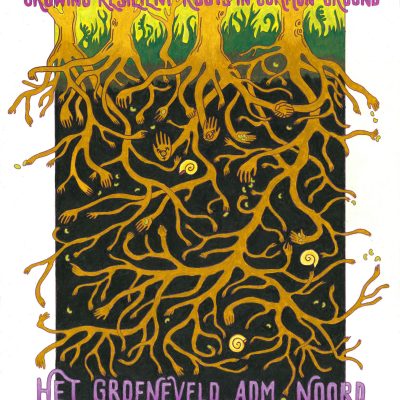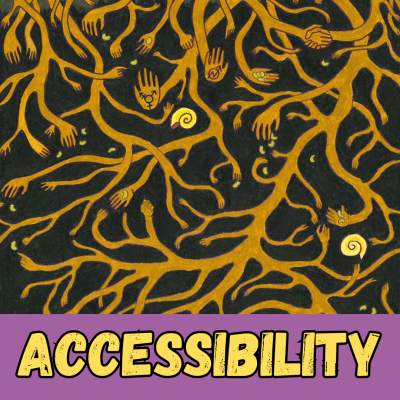
As the world’s eyes fell on the UN Climate Change Conference (or COP) for the 27th year in a row, we were once again left with anger and despair. Year after year governments and corporations have failed to take responsibility for their climate destruction. This year was no different. The COP27 was rife with greenwashing, major fossil fuel deals, a symbolic inclusion of food systems on the agenda, and fragile, non-binding promises to compensate the Global South for climate-related loss and damages. What usually brings hope during the annual COP is the mass gathering of civil resistance, as climate and social justice movements come together to demand a liveable planet. This was hindered by the placement of COP27 in a hostile police state, leaving no space for opposition against COP’s usual greenwashing theatre. Continue reading about the highlights (read: lowlights) of COP27 in the sections below!
A New Loss and Damage Fund to Compensate Climate-Vulnerable Nations
The biggest “victory” in this year’s COP is the new Loss and Damage Fund, created to motivate affluent nations in the Global North to compensate climate-vulnerable states for current and future weather-related disasters. Many institutional actors see this as a “step in the right direction”, as rich populations are finally officially held accountable for the damage they cause. However, it is doubtful whether they will actually take responsibility, as the details of the agreement are yet to be specified. And, as Alliance for Food Sovereignty in Africa (AFSA) point out, “[t]he rich countries of the Global North have failed to fulfill their 2016 100 billion dollar-a-year adaptation funding pledge.” If the funds from 2016 have still not been paid, the chances of the Loss and Damage Fund succeeding seem very slim. The deal was strongly resisted by the EU and US in the first place, and its vagueness has prompted widespread skepticism of its efficacy among resistance movements, who deem it merely symbolic. Another incidence of empty words. The initiative to repay climate debt to the Global South is also overshadowed by the size of profit that flows in the opposite direction through large-scale investments of Global North governments and multinationals, as explained by Debt for Climate:
“100 multinationals are responsible for 71% of global industrial emissions. A large part of these emissions is a consequence of the exploitation of the South, fueling a system of unsustainable consumption and waste in privileged classes of rich countries at the cost of the growing destruction and sacrifice of populations in countries of the global South.”
Governments and multinationals were busy sealing fossil fuel deals at COP27, and according to openDemocracy, “at least 15 new international oil and gas deals were being concluded.” Moreover, “Eight of those were with African countries.” Europe is reacting to the current energy scarcity with increased investment in fossil fuels in the Global South as a quick fix for a short-term problem. Those behind the Don’t Gas Africa campaign fear that such deals will lock Africa into long-term fossil gas production. The projects create both local displacement and oppression as well as an insurmountable debt that will take decades to pay off by exporting the extracted fossil fuels to the Global North. As Europe’s energy needs are predicted to shift towards renewable energy sources after the initial stages of the crisis, this once again leaves the Global South behind with a large economic burden. This is a problem that has been completely ignored by the governments and multinationals leading the investments in the Global North. This is a classic example of countries in the Global South having to pay the long-term price to cover the short-term “needs” of countries in the Global North.
Food Systems and Agriculture Finally on the COP Agenda, HOWEVER…
For the first time(!!!), the UNFCCC has included agriculture in the final text from the COP in a deal called the Koronivia Package. This has been the result of food systems finally being openly and intentionally discussed at the COP, manifesting in several food “pavilions” (event areas with themes), over 200 smaller events, and an Agriculture and Adaptation Day, where the negotiations between governmental representatives solely focused on food production. However good this might sound for the possibility of a sustainable and socially just food system, the discussions contained little more than blatant advocacy of the status quo by powerful agribusinesses.
That food production is finally considered relevant in addressing climate and social justice is a crucial improvement. However, the common sentiment among critical voices is that the deal fails to adopt a holistic systems approach, and instead only focuses on the “supply side”, while ignoring the fact that industrial agriculture comprises a third of global greenhouse gas emissions. This means that the solutions presented to large-scale systemic issues were centered around technological optimization and innovation within the existing destructive industrial framework, rather than allowing space to be critical to the underlying capitalist, oppressive structures of domination over the Global South as well as non-human nature. This way, industrial agribusinesses further entrenched a narrative of the “necessity” of GMOs, synthetic fertilizers, pesticides, and industrialized monoculture. And, as expected, small-scale farmers were vastly underrepresented compared to big agribusinesses. The lack of action will be felt among vulnerable small-scale farmers, who left the COP empty-handed according to AFSA:
“African small-scale farmers are deeply disappointed that while the COP27 decision on agriculture strengthened understanding of the massive role of food and farming in greenhouse gas emissions, it failed to develop any concrete implementation actions.”
It is important to stress here that an under-representation of the people and over-representation of large, capitalist actors, whose only objective is profit at the cost of human and environmental devastation, is nothing new. This is a common denominator in all aspects of the COP, and any aspirations towards “sustainability” and “equity” are an attempt to fit into the current “green trend”. It is a way to remain relevant, pretending to be a change-maker in sustainability, while striving to change as little as possible. It is a balance between maintaining profit and investor interest and maintaining public goodwill. Moreover, the extent to which national governments are tied into the agendas of corporate agribusinesses, means there is no pathway or incentive toward real, meaningful change within this arena.
Europe’s largest producer of synthetic nitrogen fertilizer, YARA, which ASEED has been targeting throughout the past years was, ironically, present at the COP27 in a panel discussion in the new Food Systems Pavilion. The topic of the panel was “Transforming Food Systems for Climate-Resilient Future” with international agricultural associations and politicians. The narrative of this talk focused very vaguely on the importance of innovation, partnerships, optimization, implementation, and – of course – the need for (synthetic) fertilizers to ensure food security. YARA was given a platform to greenwash their destructive, business-as-usual practices, and there were no critical voices against industrial agriculture present. YARA is currently focusing its narrative on a co-optation of regenerative agriculture, where harmful industrial practices are argued to be an irrefutable necessity and in line with so-called “regenerative practices” through precision farming. On the contrary, the fight for true regenerative agriculture was started and is led by “Black, indigenous, peasant and Majority World farmers and food workers”, and focuses on an ecosystems approach to food and farming, where biodiversity and natural processes are supported without the use of synthetic fertilizers or pesticides. ASEED denounces the appropriation of this term into capitalist and oppressive agendas. YARA’s harmful narrative also permeated the discussion at the COP, showing just how far away from real change these summits take us. Having companies such as YARA mediate panel discussions at the Food Systems Pavilion is a prime example of the ties between governments and large corporate actors with interests in business-as-usual fossil fuel consumption. As long as capitalist and colonial corporations such as YARA are given a platform at conferences such as the COP, these summits will never be able to generate real solutions to the crises we are currently facing.
As ASEED highlights through the Fossil Free Agriculture campaign, gas plays a crucial role in industrial agriculture and agribusinesses’ response to climate change. The reliance on gas to produce synthetic fertilizers grows, as big agribusinesses turn to more and more technologically advanced “solutions” to mitigate emissions. At the same time, they conveniently fail to count gas pollution in their production process as a part of their total emissions. Marketing fossil gas as a transitional fuel to bridge the way toward renewable energy sources was a pervasive theme at COP27. In fact, the conference was full of new “green” gas deals, Nature explains:
“Germany has signed a deal with Egypt to advance green hydrogen as well as exports of liquified natural gas, and other governments and companies are courting projects in countries such as Senegal, Tanzania, and Algeria.”
The narrative of legitimizing gas as a transitional fuel can also be seen in the final edit of the text after the COP, where “new wording was added proposing accelerated development of ’low-emission’ energy systems, which many fear will be used to justify further natural-gas development.” “Natural” gas is a fossil fuel that creates greenhouse gas emissions on a scale that is irreconcilable with a liveable future and should therefore be phased out completely and immediately. Naturalizing gas dependence in industrial agriculture moves us further away from environmentally and socially just food systems and must be denounced by grassroots agricultural movements.
Big Polluters Significantly Outweigh Representatives from Climate-Vulnerable Populations
Apart from the (most likely false) new hope of the Loss and Damage Fund and the overdue inclusion of agriculture and food systems in the agenda, the rest of COP27 proceeded as usual. A lot of pretty words and pictures, but very little to no concrete actions. According to the UNFCCC website, “COP27 resulted in countries delivering a package of decisions that reaffirmed their commitment to limit global temperature rise to 1.5 degrees Celsius above pre-industrial levels”. Once again, this means that there are no binding commitments to improve the half-hearted, failing attempts of the worst polluting countries at changing the current, unacceptable path towards global 2.8-degree warming. Consequently, there is no further incentive to hinder the increase of future climate-related losses and damages to the world’s most vulnerable: the new Loss and Damage Fund will have to fund more and more losses and damages if the root problem is not addressed!
One of the reasons behind the lack of climate action can be attributed to the fact that, according to Corporate Observatory Europe, “18 out of 20 of the sponsors of United Nations Framework Convention on Climate Change (UNFCCC) climate talks (…) directly support or partner with the fossil fuel industry”. Similarly, the movement Kick Big Polluters Out notes the disproportionality between representatives from Big Polluters and the Global South:
“The influence of fossil fuel lobbyists is greater than frontline countries and communities. Delegations from African countries and indigenous communities are dwarfed by representatives of corporate interests directly at odds with the level of systemic change needed to slow the climate crisis.”
This process of exclusion of those mainly affected by the climate crisis secures a global fossil fuel lock-in and allows the kind of blatant greenwashing that the COP in general represents. Director of Programs of Corporate Accountability and Public Participation Africa, Philip Jakpor, clearly states the disturbing irony of deciding the global future of emissions with predominantly fossil fuel lobbyists present:
“More fossil fuel lobbyists than the combined delegations of 15 African countries combined? A who’s who of polluters, fossil fuel financiers, and industry enablers bankrolling the COP? To a malaria conference, you don’t invite the mosquitoes.”
An Authoritarian Police State as Host and the Impact on Grassroots and Activist Involvement
It is impossible to talk about COP27 without a mention of where it is hosted. There is an obvious conflict of interest in having a climate summit in a nation where any kind of opposition to the mainstream political agenda is prohibited. Strict censorship of environmental and politically critical research and organizations in Egypt completely undermines any meaningful resistance. Only topics that focus on small, non-systemic environmental issues such as recycling and electric vehicles are welcome in discussions at COP27 while shedding light on damage caused by the state and corporations is in no way tolerated. The stark contrast between the new green bubble in Sharm el-Sheikh where COP27 took place and the rest of the country mirrors the disparity in power and agency in the climate crisis. Delegates could enjoy the COP without any disturbance from the realities of oppression and impoverishment that characterize the Egyptian majority.
Most of the resistance that would normally take place at the COP on a grassroots level (as ASEED covered last year), was simply not possible under the current circumstances, and this eliminated the perhaps biggest annual platform for activist and grassroots organizing, networking, and uprising. This year, we have lost the only real element of progress that the COP usually provides, namely everything that happens outside the actual COP. The normalization of a police state and the ramifications on a grassroots level are elaborated by Naomi Klein in an article for The Intercept (aptly titled “From Blah, Blah, Blah to Blood, Blood, Blood”:
“This summit is going well beyond greenwashing a polluting state; it’s greenwashing a police state. (…) Unlike previous climate summits (…) communities and organizations most impacted by environmental pollution and rising temperatures will be nowhere to be found in Sharm el-Sheikh. (…) That’s because organizing events like this would land Egyptians in prison for spreading “false news” or for violating the protest ban — that is if they aren’t already there.”
In addition to the atrocities committed against the general population in Egypt, the COP27 is functioning as a sort of “green lifeline” for the Egyptian government, circumventing the nation’s growing debt through increased coastal tourism and start-up investments in “green” hydrogen and “green” growth by the UK government and large corporations. Furthermore, the new Loss and Damage Fund becomes even more ironic when considering the power hierarchies of some of the nations that (might just!) receive these funds, such as Egypt: there is no guarantee that the money will actually reach those who really need it. An Egyptian journalist, Omar Robert Hamilton, addresses the issue that when giving funds to police states, the money gets stuck at the top, leaving citizens without aid: “This should be at the core of COP negotiations between Southern and Northern countries — only the ones doing the negotiating for the South tend to be authoritarian state powers whose short-term interests are even more graspingly fragile than those of oil executives.”
Addressing the climate crisis must include dismantling oppressive structures because the ecological crises we face are a direct result of these structures. This also means breaking down the centralized power of greenwashing states and corporations in both the Global North and South. The COP27 has, along with all the previous COPs, shown us that the main intention of such summits is to sustain profits for capitalist actors in a slightly green package. The real solutions come from below, from frontline communities, from farmers and peasants all over the world. If we wait for corrupt and greedy governments to act for us, we can wait forever. Painful experience has shown us that meaningful change will not happen top-down. Hope does not lie in the next COP being slightly better than the last one. Instead, we need to focus on strengthening local solidarity and the resilience of farmers and communities to fight the structural violence of agribusinesses against humans and nature.










